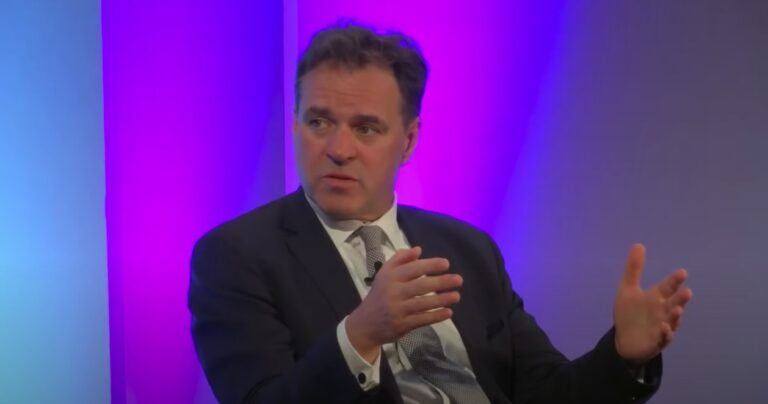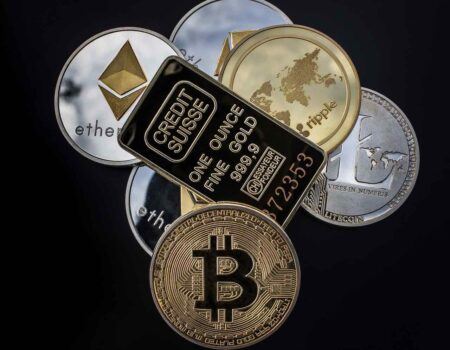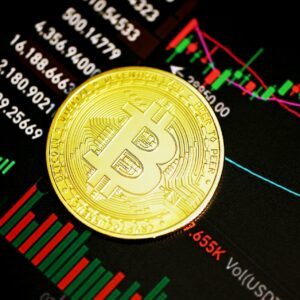In a recent interview, renowned financial historian Dr. Niall Ferguson said that he could “guarantee” that “we will have another Bitcoin bubble” and that Bitcoin will increasingly behave like “digital gold.”
According to the bio on his website, Ferguson is currently the Milbank Family Senior Fellow at the Hoover Institution (part of Stanford University), which is “a public policy think tank promoting the principles of individual, economic, and political freedom.”
He is also a senior faculty fellow of the Belfer Center for Science and International Affairs at Harvard, and a visiting professor at Tsinghua University, Beijing.
Ferguson, who was named in 2004 as one of TIME magazine’s 100 most influential people in the world, has taught at Cambridge, Oxford, and Harvard.
In 2008, he published in 2008 the book “The Ascent of Money: A Financial History of the World“. This was later adapted for television as a five-part documentary that won the 2009 International Emmy award for Best Documentary.
Earlier this month, Ferguson spoke to crypto journalist and podcast host/producer Laura Shin for episode #181 of the highly recommended “Unchained” podcast, which was released on July 14, about the history of money and the macros factors affecting Bitcoin.
He started by talking about his background in economic/financial history:
“I’m a historian, as you said, and I spent my career working on financial history, which is really my core competence.
“Many years ago, too many to count, I wrote a doctoral dissertation on the German hyperinflation of 1923 and subsequently wrote histories of a couple of banking dynasties, the Rothschild’s and the Warburg’s so that was really my path into being an academic historian, and in 2008 I tried to knit together a lot of my earlier work in a book called The Ascent of Money…
“… that book started, I guess, as a Harvard course in international financial history and by 2006, ’07 I’d come to the conclusion that it should become a book and that there was going to be an almighty financial crisis and it would be rather good timing if I could bring it out around about the time of the crisis, and sure enough by the time I’d finished…the crisis was well underway.”
He next explained how he got involved in crypto.
Since Ferguson’s book “The Ascent of Money” came out in the same year as Bitcoin's white paper (“Bitcoin: A Peer-to-Peer Electronic Cash System”), which was published by Satoshi Nakamoto, “it couldn’t be included in the book,” but it left him “intrigued” about Bitcoin.
At this point, it is worth pointing out that on 12 October 2017, Ferguson published a blog post titled “Bitcoin may go pop, but its revolution will go on”, in which he explained how “alarmists warning of a collapse miss crypto-currencies’ true potential.”
Here, he told the story of how on 7 October 2014, he had made the “worst investment decision” of his life by ignoring the advice of his then 15-year-old son (Lachlan Douglas Ferguson) to “buy some bitcoin.”
Ferguson told his son that putting money into something “based on some weird thing called blockchain technology” was a foolish financial investment, that “since ancient Mesopotamia, money has tended to be monopolised by states,” and that “the governments of the world are not about to let their monopolies on national currencies be undermined by a currency that’s already being used for nefarious purposes by criminals and money launderers.”
At that time, the price of Bitcoin was $334, and on 12 October 2017, when he created this blog post, it was $15,150:
“If I had listened to my son, I would have increased the dollar value of my investment by a factor of 45 — or, if you prefer, I’d have made a return on the investment of 4,436%… The moral of the story is clear: when it comes to technology, pay heed to teenagers.”
Another interesting observation that Ferguson made in that article was that he should have taken American economist Dr. Paul Krugman’s September 2014 dismissal of “bitcoin fever” as the product of “libertarian anti-government fantasies” as a signal to buy Bitcoin since “this was the same Krugman who in 1998 predicted that ‘the growth of the internet [would] slow drastically’ as ‘most people have nothing to say to each other’.”
Going back to the interview with Shin, says that around 2016-2017, he and his son “began really seriously thinking about crypto”, that his son helped him to greatly increase his understanding of Bitcoin, and that by 2018 (the 10th anniversary of “The Ascent of Money”), he had concluded that he had been “very, very wrong” and that Bitcoin “is part of a really extraordinary financial revolution.” This is why he updated this book with a chapter on crypto.”
Ferguson says that to “understand why cryptocurrency has become the object of so much fascination”, you need to understand two things about fiat money:
- “… for many countries, and Argentina is just one of many cases, managing a fiat currency has proved extraordinarily difficult… There are powerful political economy temptations to debase the currency… It’s easy to debase the currency if you have a central bank… It’s just the ability to create money out of the ether… That temptation has led many countries down the path of very high, if not hyperinflation, and so the obvious argument for something like bitcoin is that you are creating at least of store of value… you’ll be able to rely on even if the Argentine government or the Zimbabwe government, or the Venezuelan government decides to create currency with extremely reckless time and consistent monetary policies.”
- “… the argument you’re solving the problem of inflation works much less well in the developed world, because, in truth countries like the United States, most European countries, and Japan ceased to have a problem with inflation some time ago…”
Next, Ferguson talked about the U.S. and the current ability of the Federal Reserve to seemingly “print” an infinite amount of money:
“Because the United States issues the fiat currency, the dollar, that most transactions around the world are conducted in because a huge proportion of international trade is in dollars, and because the dollar also happens to be the most popular currency in Central Bank reserves there is almost no visible limit to how many dollars the United States can print or how many bonds it can issue, and as long as the demand for those…the currency and those bonds remains as great as the supply then, in fact, we exist in a strange and very unusual era in which there is no difference between money and bonds, because the interest rate on the bonds is zero or close to zero.
“That is the strange world we currently inhabit. To believe in modern monetary theory I think you have to believe that that world is a permanent state of affairs, or if that’s not the case then implicitly you are basing future policy on fiscal, not monetary method, in that you will use taxation to avoid inflation.
“Now, I personally don’t regard the present era as likely to continue for very long. I’m happy to go into why that is in a minute, and therefore I think we need to recognize the MMT is only credible for two reasons. A, people know virtually no financial history, B, they take the erroneous view that the present state of affairs of zero or near-zero nominal rates will continue for the indefinite future.”
Then, Ferguson discussed asset bubbles:
“Laura, I think the idea of a world without bubbles is only plausible if you replace the human race with some other species that isn’t susceptible to our many cognitive biases…
One of the arguments I tried to make in The Ascent of Money was that this evolutionary financial system ultimately is subject, more than anything else, to the human psyche and I’m not talking here just about your gradient fear story. It’s a more profound point than that. Ultimately, the price of any financial instrument, whether it calls itself money, or a bond, or a stock is the reflection of expectations more than anything else. The expectations of the future price level in particular, and historically expectations of inflation have in fact fluctuated quite widely right now. In the principle developed economies, they seem remarkably stable and low, but that’s an odd state of affairs and quite unusual. For most of history, there have been big fluctuations in the price level and periods of high inflation, which have often taken people by surprise because wars are not predictable and wars have been historically the principal driver of unexpected moves in the price level, so history is really a kind of learning process.
“People periodically suffer from amnesia, we’re going through one of those phases now, and they forget that time and consistent policies by governments regularly produce bursts of inflation or even defaults…
“Now that brings us to the question of whether you can kind of create an instrument that is somehow immune to these fluctuations and sentiment, and the answer is you can’t. Gold isn’t a solution because remember, gold has fluctuated tremendously in its dollar price over the past century, and you can never be entirely sure that gold would continue to be available to you as a store of value…
“The idea that bitcoin can somehow solve a problem that gold couldn’t solve, that nothing has been able to solve was never, to me, plausible and the volatility of bitcoin as a financial security, which is how it sometimes appears to behave is the proof of that.
“What you’re seeing when bitcoin’s price fluctuates widely, as it’s done in the last five years, is not variations in the supply of US dollars.
“These are fluctuations in expectations of investors about the future of bitcoin, and as we all know, as everybody listening to this podcast knows, those fluctuations have been enormous because there’s great uncertainty about the future of bitcoin.
“That’s why we will have another bitcoin bubble at some point. I can guarantee that, and during that whole cycle, which will be, what the fifth? I’ve lost count of the big bitcoin bubbles there have been. There’ll be the same debate that we had back in 2017 between the people who say it’s going to the moon and the people who say it’s Shitcoin, it’s going to zero, and both of these views will be wrong.
“Over time I think bitcoin will seize to behave like an option. I think it behaves like an option on digital gold right now. A term that I owe to my friend Matthew McLennan at First Eagle, gradually over time the longer it survives and the more useful it appears to be bitcoin will behave less like an option on digital gold and more like digital gold.
“I take the view, and I’m probably going to annoy a majority of listeners now, that bitcoin isn’t going to become money in the sense of the means of payment.
“I think bitcoin is a peculiar kind of digital gold that people will want to hold in their portfolios because it has behavior different from other asset classes and it’s not closely correlated with them, and I think the more people who take the view that bitcoin will live, that Roubini is wrong, the more people will hold it in their portfolios, and that’s a preference for bitcoin as an asset with a diversification quality that will push up its price.
“Its price will not go up gradually it will go up in steps and each step will look like a bubble, and each time the bubble bursts Nouriel Roubini will say, you see? You see? And each time he’ll be wrong.”









